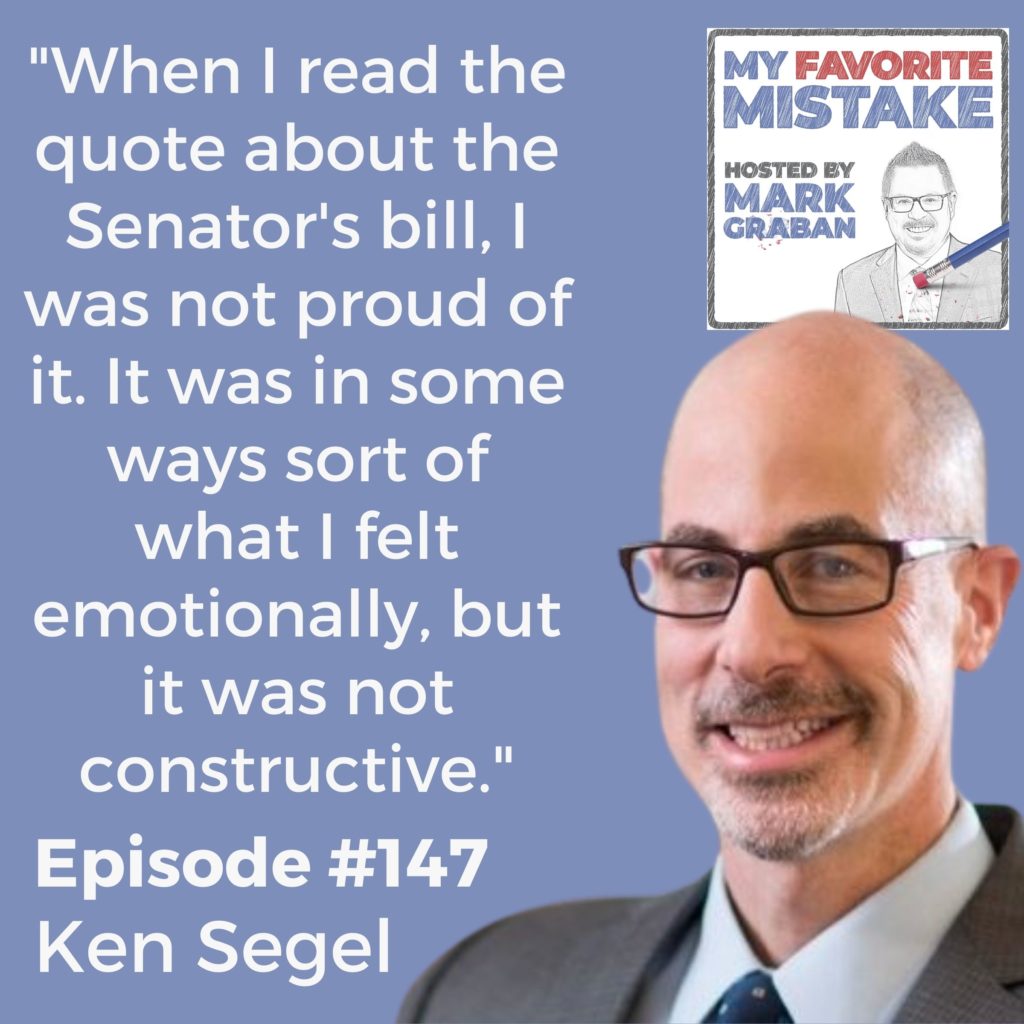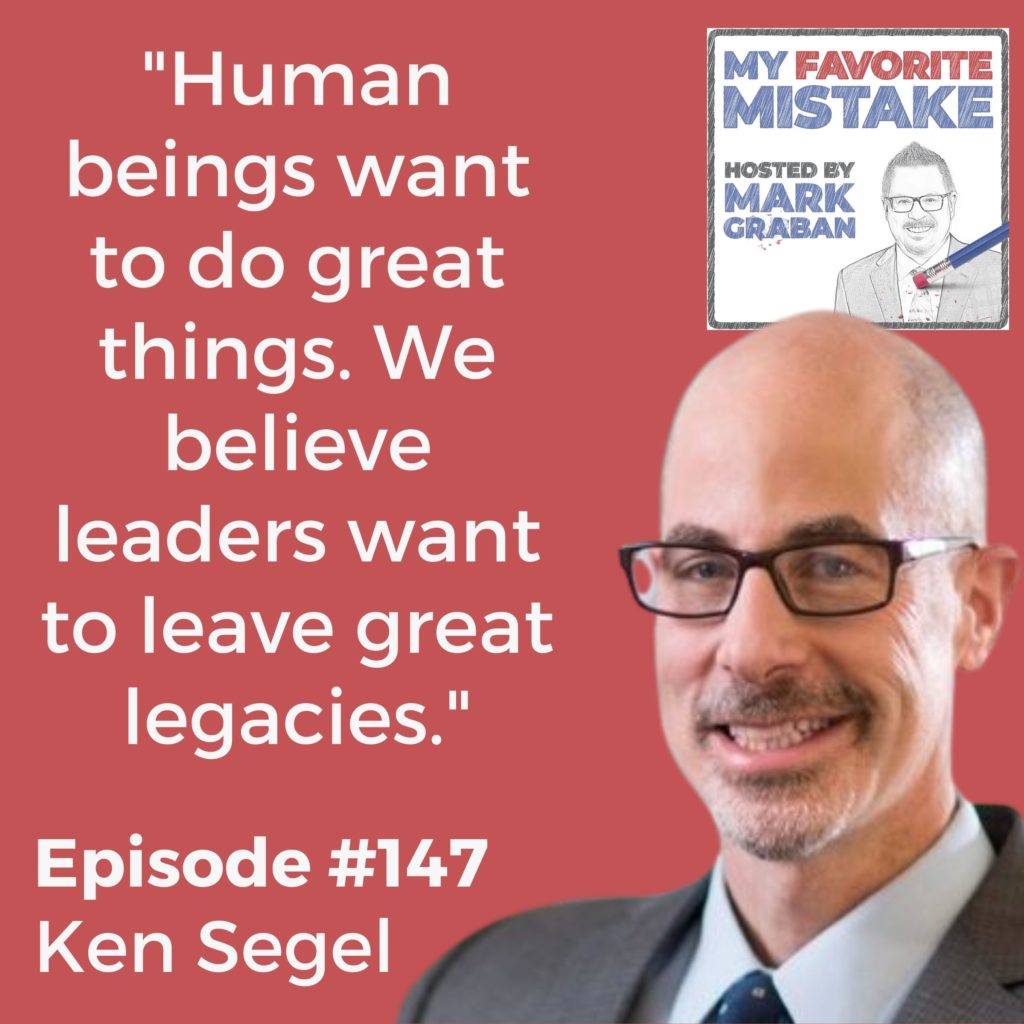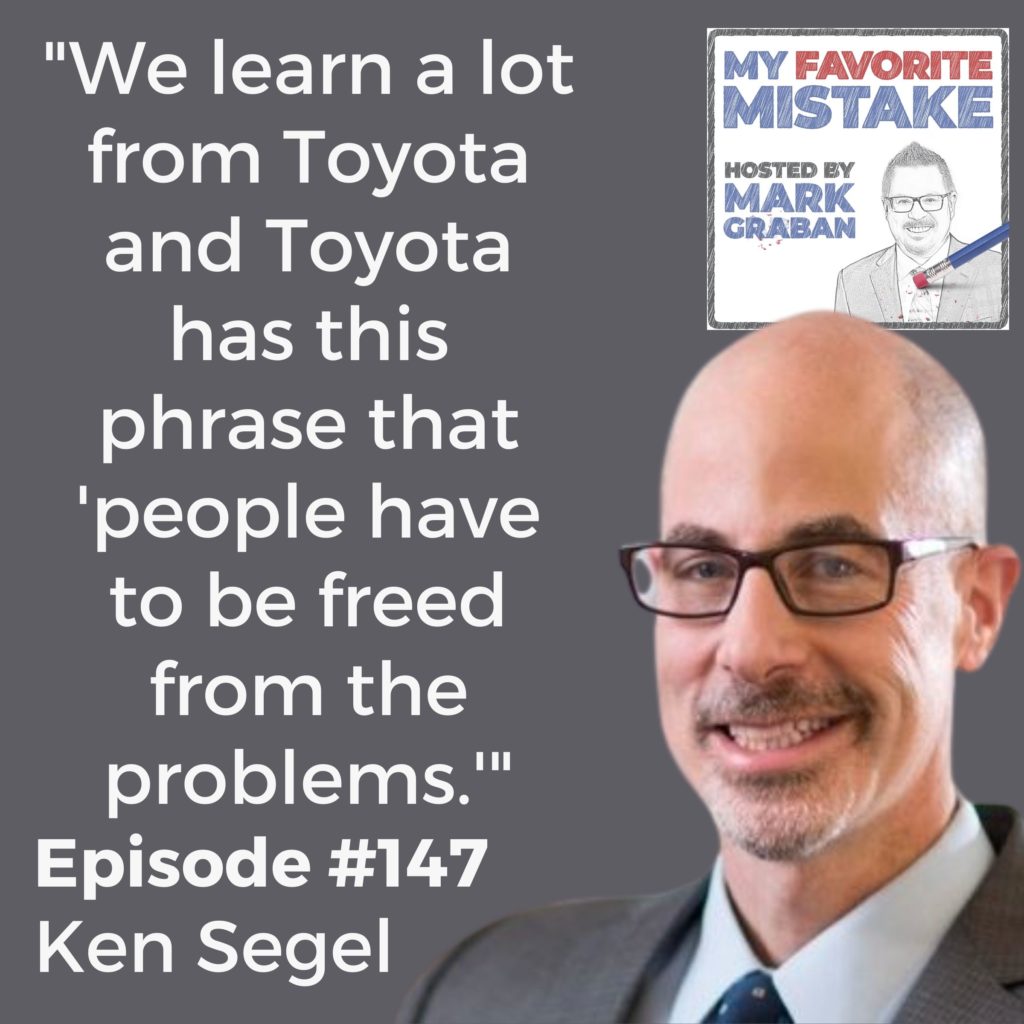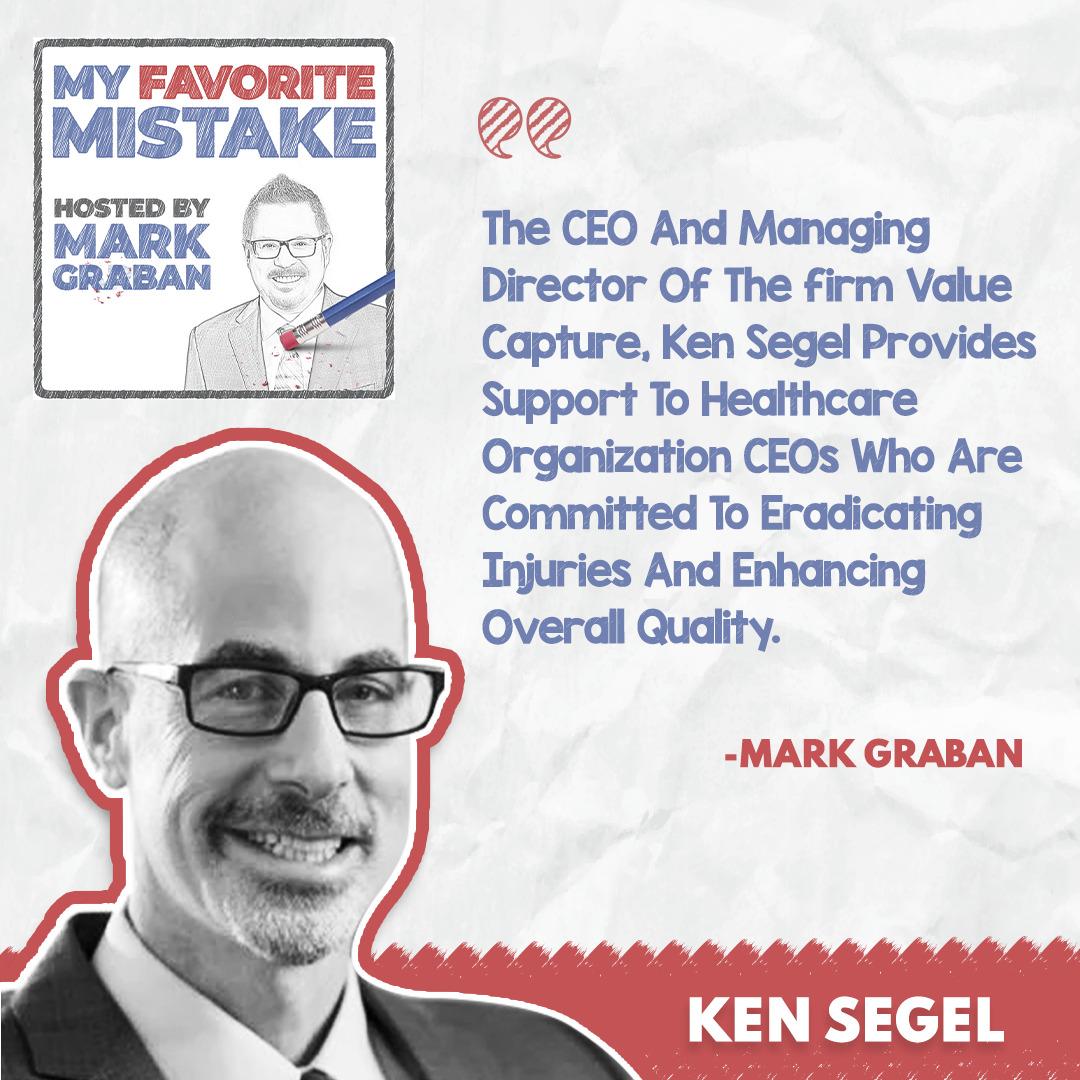Listen:
Check out all episodes on the My Favorite Mistake main page.
My guest for Episode #147 of the My Favorite Mistake podcast is Ken Segel, the CEO and Managing Director of the firm Value Capture. Value Capture is a trusted advisory firm that supports chief executives who seek to transform the performance of their healthcare organization in safety, quality, and profitability.
In terms of disclosures, I have been a subcontractor to Value Capture for four years, serving as a senior advisor to healthcare clients and, during pandemic times, working as the Director of Strategic Marketing for the firm.
Prior to forming Value Capture, he served as the founding director of the Pittsburgh Regional Healthcare Initiative (PRHI) and he served for five years as Senior Program Officer at the Jewish Healthcare Foundation of Pittsburgh.
Earlier in his career, Ken worked in government and politics, with various roles including directing the overnight operations in the 1992 Clinton-Gore presidential campaign “War Room.”
Ken has a B.A., Harvard University in American History and Literature and an M.B.A. from the University of Pittsburgh
In today's episode, Ken shares his “favorite mistake” story about a time when he was a young legislative aide to Rep. Howard Berman. What went wrong when he went “on background” with a USA Today reporter? Why did he get a copy of the clipping with a “SEE ME” note from the Congressman?
Questions and Topics:
- What happened when Ken met with the Congressman?
- Immediate lesson learned about speaking to reporters?
- Another lesson – wasn’t proud of the quote, wasn’t constructive
- Leadership lessons?
- Learning from mistakes
- Berman was “a people developer”
- Psychological safety
- Not carte blanche for making more mistakes
- How does psychological safety lead to better performance?
- You mentioned learning from Toyota… What did you learn from the late Paul O’Neill about improvement and preventing and learning from mistakes?
- Aspirational goals… theoretical limits
- Tell us more about Value Capture – free eBooks
- The podcast “Habitual Excellence”
Find Ken on Social Media:
Watch the Full Episode:
Quotes:



Subscribe, Follow, Support, Rate, and Review!
Please follow, rate, and review via Apple Podcasts or Podchaser or your favorite app — that helps others find this content and you'll be sure to get future episodes as they are released weekly. You can also become a financial supporter of the show through Anchor.fm.
You can now sign up to get new episodes via email, to make sure you don't miss an episode.
This podcast is part of the Lean Communicators network.

Other Ways to Subscribe or Follow — Apps & Email
CEO Ken Segel Talked Frankly To A Reporter When He Was A Congressional Aide

Episode 147, Ken Segel, CEO of the healthcare advisory firm, Value Capture. He started his career as a congressional aid.
—
Our guest is Ken Segel. He is the CEO and Managing Director of Value Capture. Value Capture is a trusted advisory firm that supports chief executives who seek to transform the performance of their healthcare organizations in safety, quality, and profitability. In terms of disclosures, I have worked as a subcontractor with a partner in collaboration with Value Capture. It's going on for years now. I've served as a Senior Advisor to some of their healthcare clients, and during pandemic times, I've had a role as Director of Strategic Marketing for the firm. I want to make sure that that's all disclosed. With that, Ken, welcome to the show. How are you?
Thanks, Mark. I'm great. I'm excited to be here and share some of my mistakes.
I'm excited to hear your story and have a conversation about that, healthcare improvement, and leadership. Let me tell you a little bit more about Ken before we get started. Prior to forming Value Capture, Ken served as the Founding Director of the Pittsburgh Regional Healthcare Initiative and served for five years as Senior Program Officer at the Jewish Healthcare Foundation of Pittsburgh.
I've heard some interesting stories from his career. Ken will have a good one to share. Earlier in his career, he worked in government and politics in various roles including directing the overnight operations in the 1992 Clinton-Gore Presidential campaign, War Room, as it was famously called. Ken has a Bachelor's from Harvard in American History and literature and an MBA from the University of Pittsburgh. Ken, with these different phases of your career and the things that you've done, looking back at it, what would you say is your favorite mistake?
In my career, which is checkered, as you've outlined, it wasn't hard for me to think about my favorite mistake and to come up with it right away. It was incurred during my very first year out of college. In my first full-time job, which was as a legislative aid on Capitol Hill, it landed what for me at the time, was a dream job working for a very respected member of Congress from a state that I thought was exciting, California. Things got even better for me right away. I stumbled into a situation where the senior aide above me was about to head out on pregnancy leave. I got handed a whole set of significant responsibilities on sets of issues I cared about to be the advisor to Congress and support him.
One of those was supporting him in his key role in the Judiciary Committee, which had key oversight over immigration issues. In this office, we were right in the middle of a crucial phase in immigration policy, which continues to be very controversial. The year here was 1988. In 1989, I'm a year out of college, and three years before, Congress passed a major immigration reform compromise. We were in the phase of overseeing the regulations as they were written and put phase. The way Congress worked at that time was that every member of Congress was responsible for voting and having a sense of what was going on, on every issue, domestic, and foreign, in the nation, if you think about it. There is only so much bandwidth to go around in terms of thinking about that.
My office was 1 of 2 on the House side and 2 on the Senate side that delegated a lot of the authority of this oversight in an informal by the formal leaders in the sense that these folks can agree on things, then we're okay because they have different perspectives. My boss represented the farm workers. Another member in the House had large grower constituencies that depended on immigrant labor. In the Senate, there was a liberal senator who cared a lot about this stuff, Teddy Kennedy, whom many people will realize, and a conservative member Alan Simpson from Wyoming, who is an important figure in our history.
We would all work on these issues together and were looked to, but we didn't see the issues the same way. We were indeed debating these behind closed doors lots of times. One day, I got a call from a 22-year-old kid from a USA Today reporter. I was already starting to talk to some senior reporters from different significant publications, and I did the thing I was supposed to do. I went into the background and talked frankly with this reporter about issues in immigration and what was going on.
Explain on background for people who aren't familiar with what that means and the implications.
By going on background, you're saying, ” I will give you information and speak generally to try to help you understand the situation, but you cannot quote me.” We would have to talk about that because, in effect, I would have to be less frank and direct potentially and have to think about that. It's a ground rule. It’s established in different conversations. There are pluses and minuses to that, but it's a convention when talking with people with certain sensitive information.

We have the conversation and two days later, the morning of, I get a clipping in my box. This was the days before everything was flowing over our computers via email. The clipping is a copy of the USA Today story. The Congressman has written in the story, “See me,” and I read the story for the first time. I had a quote in the story saying that Senator Simpson's Bill treated people from whole sections of the world, including Africa as if they were the plague, not human beings, seeking a better life for their kids. We'll talk a little bit about what might have gone through my head.
Parts of my life were passing before my eyes, and it was not a good feeling both to see that I have been quoted in this way and to see that my boss needed to see me. The story evolved, and it took me all day to get to see the congressman. He was busy, and I assumed he would want to do whatever he was going to do quickly, and would be quite angry, but I couldn't get in to see him. I finally got in at the very end of the day, maybe 6:00 PM or 6:30 PM. I got into his office, and he started asking me questions about other stuff we were working on, including budget reconciliation and other things.
I was, at first, dumbfounded, but I tried to hang in there. Our conversations were usually me giving information, but also seeking to learn. We came to the end of that stream of discussion, and he seemed done. I said, “Howard, didn't you want to talk about this?” I held up the clip, and he looked at me and said, “Yeah. Do you understand why that's problematic potentially?” I said, “Do I understand why that's problematic?”
I was on background, I thought. I gave this reporter too juicy a quote and/or she forgot. The next thing he said was, “Learn and we'll go on. Forget it.” He took his copy of it, crumpled it up in front of me, and threw it into this trash can. At that moment, in terms of how he handled it and how that made me feel, that made it easily my favorite mistake.
I want to unpack some of the lessons learned, leadership style, and everything involved there. Going back to the reporter, you were wondering out loud, did the reporter forget? Was it a misunderstanding? Was it too juicy where it was a bit of a betrayal? You don't know.
I don't know, and I don't recall ever finding out. I felt so vulnerable in that position that I was certainly going to guard my P’s and Q’s very carefully with that reporter and probably with other reporters for a while after that. I did not feel in an empowered position to confront that reporter. I certainly don't have a memory of understanding what happened.
Can you elaborate a little bit more on that immediate lesson learned? You said being a little more careful with that reporter or other reporters was the mistake, as you described, giving something that was too juicy. What was the adjustment then in talking to reporters?
It's interesting because my deepest lessons from that mistake are in a different place, or how the congressman handled me making a mistake from an authority standpoint. When one has experiences like that, you become a little more reflective of other people's roles and how you interact with them. To some degree, my assumption still is that we're all on the same team. We're on the side of truth and light and to proceed openly that way.

I do think it's important, particularly when there are other people's sensitivities involved, to realize that there are patterns to be careful about, even sometimes, beyond doing technically the right thing as I did by saying I was going on the background but reiterating and things like that. There were probably some slight behavior modifications. Again, I'm proud that I didn't shut down.
I also think it's interesting. There was another lesson that I got from it, which is when I read the quote about the Senator's Bill, I was not proud of it. It was, in some ways, what I felt emotionally. It was defensible, but it was not constructive. I did not like the thought of my parents reading me quoted in such a slang-based fashion painting with a pretty broad brush.
[bctt tweet=”When I read the quote about the Senator’s bill, I was not proud of it. It was, in some ways, sort of what I felt emotionally, but it was not constructive.” via=”no”]
It was a colorful phrase. Maybe the ability to turn a colorful phrase when pointed in a good direction helped you then later become a speechwriter and do some other things.
I did because, in terms of career sense, I survived this mistake. We'll talk a bit more about that, but I was able to go on to a role with the House leadership and the Democratic Party as the policy director. It was fortunate to have had these learning experiences on the way. As the theme of your show, it's often the things that go at least slightly wrong or, in some sense, viscerally wrong and in the process around it that teaches the most fundamental lessons.
It's about learning from the mistakes we all make, and better to learn from them. Back to the leadership question, the leadership point that you raised about the congressman's reaction, how a leader responds in the face of an error means a lot whether it's in any workplace, politics, healthcare, or what have you. I could see a different boss or environment where you would've been, at best, chewed out, maybe having your job threatened, or being put on notice. Do you think the congressman learned from this? He probably feels bad enough. No reason to make him feel worse.
I think so. He doesn't need to be anonymous. This congressman is Howard Berman, whom I hold in very high regard to this day. He's no longer in Congress. I would be roleplaying to put myself in his head and what he assumed. Like many great leaders, Howard is a people developer, and he took real pride in his team, and people who were bright and wanted to help make the world a better place were willing to work with him. He clearly saw it as part of his role to develop us, but also, there's a trite word of power, but it was to partner with us on these things.
He was not falsely humble. He was a super bright person, and he was also not overly malleable. He had strong views about things, but he viewed himself as very much the leader of the team. There are many moments that connected this for me, where I could see him taking pleasure in the quality of our work and the dynamics of how we work together as a team, not just me and him or one-on-one, but everybody felt well supported.
He was also comfortable with power and trying to make things happen. Again, like other good leaders, he understood the power of people being turned on to do great things and supported them to do that. Many other members of Congress have a very different leadership style, which is based on a lot of aggression and taking advantage of their authority over others, but he quite deliberately chose a different way.
I want to bring up a topic or a thought here that's come up in some other episodes previously, this idea of Psychological Safety. I'm going to read it. A page on the Value Capture website talks about psychological safety and the important ties to improvement. The one definition of psychological safety says, “a workplace and environment in which you feel included, safe to learn, safe to contribute, safe to call out problems safe, to make mistakes, safe to challenge the status quo, all without fear of being embarrassed, shamed, blamed, marginalized or punished in some way.”
There are two reflections I'll share. One is that Value Capture works with healthcare leaders to help create this environment within the healthcare organization. For me, working with Value Capture, and again, to the reader, Ken is the CEO of Value Capture, an organization that I do a lot of work with. I feel that sense of psychological safety internally where I could come to you, Ken, and say, “Ken, I made a mistake. I said the wrong thing to a client, and the client's upset.” I feel like I would have the safety to bring that forward for a constructive conversation, not to get blamed, not to get yelled at, and not to be belittled or threatened in some way. I appreciate that that's your leadership style, Ken.
Mark, that means so much to me, and I feel very imperfect at it. I certainly got the pattern early from Howard, others, and my parents. You feel like we’ve together created that environment, and similarly, I feel safe with you. I treasure your candor and that of the other team members, and people don't hesitate to say, “Ken, you could do better on that next time.”
Like many things, it's a never-ending journey to create and strengthen that environment. We all have moments where we don't live up to the standard, we hold ourselves to when it comes to leadership behaviors. Those are part of the mistakes we learned from.
I will never forget what it felt like the burden lifting as he indicated how he would deal with it. Putting it aside in that connection to psychological safety, I felt included. I felt safe to make that mistake. As a fundamental member of the team in the enterprise in a way that took on much more depth after that moment because I’d been at a low point, at a scared point, at a fear point, at a psychologically unsafe point, in my head, and he transformed it. After that, I was forever with Howard because I knew he was committed to that environment and then demonstrated it.
Whether it's you and the congressman or me and other leaders at Value Capture or thinking of nurses or other healthcare professionals and their leaders, that psychological safety response of not rushing to blame the individual, not belittling them, not saying things like, “What's wrong with you?” instead looking at systems, processes, and those contributors, taking that view doesn't then provide carte blanche to go keep repeating the same mistake or being reckless. Can you talk about some of that balance of why that environment of psychological safety and those leadership behaviors end up leading to more improvement and better performance?
We learn a lot from Toyota, and Toyota has this phrase that people have to be freed from the problem, so they're free to work on the problem and beyond that, required to work on the problem. Anything we're part of because we were part of it, we have very close knowledge of it, and may touch our function, or we may have been directly part of it. Systemically, the only way we will keep problems like that from happening in the future is if we work hard together on prevention, learn from what happened, and build stronger processes together so that the people are supported not to make that mistake.
[bctt tweet=”We learn a lot from Toyota, and Toyota has this phrase that “people have to be freed from the problems so they’re free to work on the problem.”” via=”no”]
Whether it's deepening our training, changing our procedures for when very young age talk with national reporters, and/or in a way much more significant examples of that in healthcare, to allow staff to succeed in what they want to do in caring for patients in very unsafe, high-risk systems without making errors. That's how we improve.
Psychological freeing is crucial. It is not carte blanche, as you say. It is freeing you from the fear part of it. Your obligation kicks in to be part of the improvement and energy converts. Certainly, if you're not showing a commitment to the learning or the deepening of the capability cycle that's going on in the organization, and that's a different set of behaviors that says, “Do we want to get better or not?” That, of course, would have to be checked. Most people, when given psychological safety, especially when things go wrong, respond much as I did. Not that there isn't sometimes processing that has to happen, but who are further into that improvement cycle.
Part of the leadership mindset is this belief that people want to do good work. People don't want to make the boss or the party look bad through a quote in the paper. People don't want to make mistakes in healthcare that might end up harming a patient or worse. If you could share more of your thoughts on that belief or how do we develop that idea that everybody wants to do good work, how do we tap into that instead of assuming the opposite?
Coming from that very earliest experience and then through the things we do together in healthcare and those we've learned from, it is always about the people, how they feel, and what they want to do. What they want to do is succeed in their work. If we think about it in healthcare, it is to help people get better, and that's what everybody gets to work wanting to do every day. When you think about it as the potential for an error or harm is not a quote in the paper but actual damage to human beings, physical life, and the emotional damage beyond that, the stakes are very high.
Again, the great leaders in healthcare and those that have their organizations reach the highest level, as you say, are rooted in this recognition that people aspire to succeed, do great work, and fulfill their human promise. If that's true, our job, as leaders, is to inspire that in part by picking out the right goal that says we, as an organization, are going to learn together how to keep everyone safe. Zero harm for our patients. Zero harm for our staff.

By the way, as you hinted at and introduced Value Capture, that's a way of making our values true and learning how to be excellent amidst very complex high-risk processes. We start with the inspiration, and then we attach the learning system to that with the psychological safety to learn quickly, to know when things go wrong or aren't right, bring them out into the open, and systematically analyze them using a set of principles, make changes, and share those changes either to recover from something gone wrong or a risk.
The moment we take the different philosophy as you suggested, we've seen this. Why do I need better people? I don't know why people can't get this right. When our mindset says, “My folks are letting me down,” as a leader, there's going to be a blame part of the reaction. That will do further damage to the person who is part of the incident because they want to succeed.
It has this horrible impact on safety itself and on excellence itself because if there is any way that I can make sure that the mistake I was a part of or the risk I detected does not become known to anyone else because I think I'm going to be blamed for it, a significant portion of people will protect themselves by hiding that information and then ipso facto, we can't prove.
You mentioned earlier learning from Toyota. When you talk about leadership, one of the companies that learned from Toyota was Alcoa. The CEO at the time, was Paul O’Neill who passed away in 2020. You had the opportunity to work with and get to know him a lot. What did you learn from Paul O'Neill about improving and helping prevent or learn from mistakes in a workplace?
In a way, everything I've been talking about since the My Favorite Mistake story is profoundly influenced by how Paul O’Neill himself framed and taught these ideas and the evidence he created about how by creating the right level of psychological safety and attachment to aspirational goals and then a rapid transparent improvement cycle that people could do great things.
Many of these ideas and proofs are rooted in Paul's work as a leader and his desire for all of us to recognize these truths and to take them in as leaders, formal and informal, and make them part of our lives so that human beings and humanity can progress toward doing the remarkable things we're capable of. A couple of examples, Paul believed that safety and pursuing safety, physically, and psychological safety around it, was a way to create evidence that the mission statement you said for your organization was true because you weren't hurting people.
It's a concrete way to create this dynamic that we're talking about. He had this way of thinking about goals that he coined theoretical limits, which means that if the laws of nature don't prevent us from doing something because we physically literally can't, by the laws of nature, then it's possible, and using that to open up our thinking about what's possible for us as human beings.
The other part attached to that is that this all was meant to serve dignity and respect for every human being without any regard to any distinguishing factor that they have. The special obligation of leadership is to create the conditions by which that dignity is respected, people are given the tools and the support needed to make a difference in their life, as I was, very early by the congressman, despite making a mistake and then recognized for the work that they were doing and supported as part of that system. I could go on and on about things I learned from Paul, but it's his example that we're building from.

For people who would like to learn more of these lessons from Paul O'Neill, the Alcoa story was featured in a chapter of the book, The Power of Habit, by Charles Duhigg. We have a couple of free eBooks on the Value Capture website. One is a collection of transcribed speeches from Mr. O'Neill talking to healthcare audiences. It's about leadership. The benefit of the message goes beyond healthcare.
There's another eBook where people like Ken, physician leaders, and others talked about the influence, The Lasting Impact, as that book is titled. We also have a show series that I produce and host called Habitual Excellence. We encourage you to search for that. There are discussions with Ken and with others. The topic is sometimes the influence of Mr. O'Neill, but in a lot of episodes, it's people talking about the important work they're doing to improve healthcare, the leadership role. I hope people will check that out as well.
It's great work and you always do a great job facilitating those conversations and bringing out the important points.
Thanks. I appreciate that. The website is www.ValueCaptureLLC.com. Ken, maybe as a final question, it's the classic elevator speech question. You're somewhere, and a hospital CEO ends up on the elevator and introduces you. Maybe it's a relatively tall building, and that executive was to ask you, “Ken, what does Value Capture do?” How do you explain that?
Our mission is habitual excellence, starting with safety. As you explained about our belief that human beings want to do great things, we believe leaders want to leave great legacies that people remember long past they were there because they helped other people, the organizations that they lead, accomplish remarkable things starting with keeping all of their people and their patients safe, but going on to be the best in the world at everything that they do. Out of some of these very fundamental beliefs, Mark, that you and I talked about, what I would say to that leader is by setting the right goals and then creating the right learning system behind it, that unleashes people's desire to do great work and guides it. We can help them leave the legacy as a leader they are in their heart hoping to.
[bctt tweet=”Human beings want to do great things. We believe leaders want to leave great legacies.” via=”no”]
When you talk about aspirational goals, the aspiration to leave a great legacy and to have nobody harmed, whether that's providers, healthcare employees, or patients, that does rely on the learning system, that includes learning from mistakes. That's why I knew you would have a great story and reflections along those lines here on the show. I appreciate you being here, Ken.
It was fun to talk a lot about healthcare but talk about some of the universality of these principles as your show shows, Mark, starting with one from outside healthcare for me.
Thank you for connecting those dots. Again, our guest is Ken Segel, CEO and Managing Director of Value Capture. You can learn more about the firm, you can go to www.ValueCaptureLLC.com. Ken, thanks again. This has been great. Appreciate it.
Thanks for having me.
—
Thanks again to my colleague Ken Segel for being our guest.
Important Links
- Value Capture
- The Power of Habit
- Rep. Howard Berman
- Psychological Safety
- Paul O’Neill
- Theoretical Limits
- Free eBooks
- www.ValueCaptureLLC.com
- Habitual Excellence podcast

